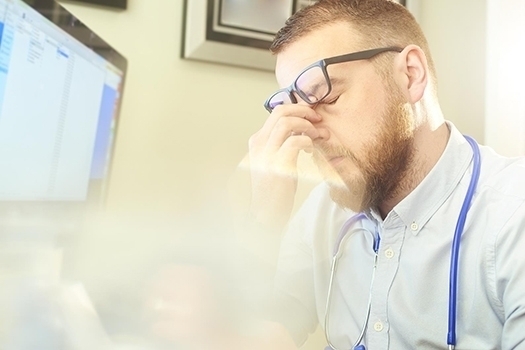Doctors with burnout are twice as likely to make mistakes, such as incorrect diagnoses or wrong prescriptions, according to a new study.
Researchers from the University of Manchester and Keele University analysed studies on clinician burnout, and found that it could ‘jeopardise’ patient care.
The authors said burnout is the result of a growing ‘performance culture’ within the NHS, along with the ‘enormous pressure’ faced by doctors, and have called for investment into improving physician wellbeing.
The paper, published in Jama Internal Medicine, looked at the association between physician burnout and patient safety, professionalism and patient satisfaction.
The research team carried out a meta-analysis of 47 studies, which included 42,473 physicians, and found that burnout was associated with a 2-fold increase in odds for unsafe care and unprofessional behaviour, such as not following treatment guidelines and poor quality of communication.
They noted that the association between burnout and unprofessionalism was particularly high in early-career physicians.
The study also found that patient satisfaction was three times more likely to be lower when doctors were physically, emotionally and mentally exhausted – core signs of burnout.
The paper said: ‘This meta-analysis provides evidence that physician burnout may jeopardise patient care; reversal of this risk has to be viewed as fundamental health policy goal across the globe.
‘Healthcare organisations are encouraged to invest in efforts to improve physician wellness, particularly for early career physicians.’
Study author Dr Maria Panagioti, a senior research fellow at the University of Manchester, said: ‘Clearly, this is not is not the fault of doctors. It’s caused by a combination of factors including high workload, the way teams work together and the absence of measures which improve wellbeing.’
She continued: ‘But it’s also about a performance culture which in recent years has become more prevalent in the medical profession.
‘Doctors are increasingly being asked to be superhuman, when they are not. They need care and attention that anyone would need when under such enormous pressure and that is just not happening.’
GP and professor of general practice at Keele University Professor Carolyn Chew-Graham, who also authored the study, added: ‘This reinforces the need for policy-makers to ensure that healthcare systems support clinicians, and that clinicians recognise symptoms of burnout in themselves and others, and either seek or offer help and support.’
This comes after the leader of the national GP mental health support service revealed that over 400 doctors have died by suicide in just four years.
And a recent survey found that two in five GPs have suffered from a mental health condition.

















